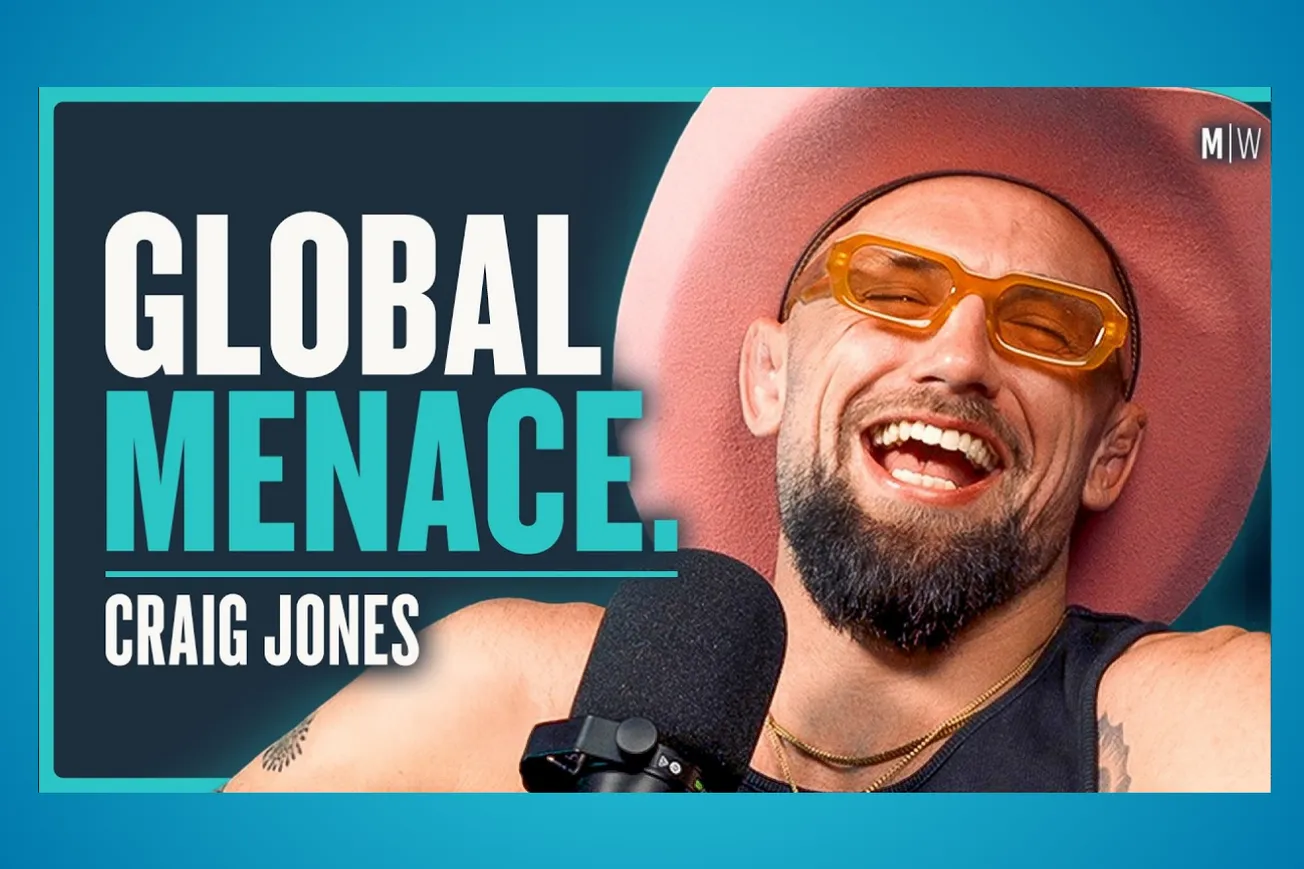Table of Contents
Craig Jones reveals his wildest adventures from getting drugged in Colombia to witnessing disturbing tribal ceremonies in Ethiopia, all while building the most disruptive tournament in Brazilian Jiu-Jitsu history.
Discover how a night out in Medellín nearly killed the B-Team founder and why his unconventional approach is revolutionizing professional grappling.
Key Takeaways
- Craig Jones survived scopolamine poisoning in Colombia after unknowingly consuming "devil's breath" during a night out in Medellín
- He met Pablo Escobar's sister through Instagram connections, leading to dinner and tours of the cartel leader's former properties
- Ethiopian charity work exposed Jones to extreme poverty and disturbing tribal practices including ritualistic whipping ceremonies for young women
- The Craig Jones Invitational (CJI) has evolved from personal vendetta to protective fortress against corporate monopolization of grappling
- Jones reconciled with former mentor John Danaher despite previously "tearing apart" the Danaher Death Squad from within
- His travels to sanctioned countries like Venezuela demonstrate complete disregard for conventional travel restrictions and diplomatic protocols
- Charity work in Peru and Ethiopia provides karmic balance for his controversial public persona and treatment of competitors like Gabby Garcia
- The team-based Quintet format for CJI 2 aims to make grappling more exciting through last-man-standing dynamics and mysterious competitor reveals
- Jones advocates against exclusive athlete contracts that would create monopolies and reduce competitor leverage in negotiations
Timeline Overview
- 00:00–03:41 — The First Craig Jones Invitational: Recap of CJI 1 success and subsequent five-day Colombian bender celebration
- 03:41–05:52 — Meeting Pablo Escobar's Sister: Instagram connection leads to dinner with cartel family member and property tours
- 05:52–13:15 — Getting Drugged in Colombia: Scopolamine poisoning incident during night out with personal assistant Seth in Medellín
- 13:15–24:30 — Charity Work in Ethiopia: Visiting impoverished jiu-jitsu schools and witnessing disturbing tribal whipping ceremonies
- 24:30–27:07 — Trying Ketamine With the Locals: Giving Ethiopian goat herder existential crisis through psychedelic experience around campfire
- 27:07–30:28 — Why Craig Got Arrested in Bali: Discussion of international drug laws and British/Australian disregard for foreign regulations
- 30:28–34:14 — Building a School in Peru: Expanding Guardian program facilities in poverty-stricken surfing communities affected by drug culture
- 34:14–38:20 — Exploring the Favelas in Brazil: Gaining access to Rio favelas through jiu-jitsu connections and witnessing drug operations
- 38:20–46:55 — Adventures in Venezuela: Visiting sanctioned country, exploring Angel Falls, and dealing with communication blackouts
- 46:55–55:06 — The Second Craig Jones Invitational: Team-based Quintet format with $1 million prize and Olympic wrestler Gable Stevenson opponent
- 55:06–59:14 — The Fallout From ADCC: Corporate takeover of Flow Grappling and strategy to prevent grappling monopolization
- 59:14–1:04:25 — Making Grappling More Exciting: Storyline importance, spectacle elements, and learning from professional wrestling entertainment
- 1:04:25–1:08:37 — Reuniting With John Danaher: Reconciliation with former mentor despite past conflicts over team destruction
- 1:08:37–1:11:49 — Future Ambitions of CJI: Protecting athlete rights against exclusive contracts and corporate monopolization attempts
- 1:11:49–1:14:59 — Craig's Thoughts on Greg Souders: Coaching philosophy differences and influence on problem-solving versus traditional drilling methods
- 1:14:59–1:18:29 — Cornering in UFC: Building fighter confidence and dealing with traumatic brain injury risks in MMA competitions
- 1:18:29–1:20:58 — Building Up Confidence in Fighting: Overconfidence versus under confidence balance and importance of trusted coaching relationships
- 1:20:58–1:26:22 — The Past & Future of Grappling: Evolution of tactical trends based on rule sets and competition popularity
- 1:26:22–1:27:21 — Craig's Training: Reduced training due to target-on-back syndrome from promotional responsibilities
- 1:27:21–End — What's Next for Craig: European seminar tour and mysterious charitable fundraising mission
Surviving Scopolamine: The Devil's Breath Incident
Craig Jones's Colombian adventure took a near-fatal turn when he unknowingly consumed scopolamine, known locally as "devil's breath," during what should have been a casual night out in Medellín. This incident reveals both the dangers of international party culture and the loyalty of trusted companions in life-threatening situations.
- The drugging occurred during a relatively tame evening when Jones was pacing himself after weeks of Colombian partying, accompanied by his personal assistant Seth who had recently received stem cell treatments
- Scopolamine's unique properties allow complete incapacitation while preserving victims' ability to remember banking details and perform complex mental tasks, making it ideal for robbery
- Security camera footage revealed Jones's zombified state where he could input door codes perfectly while being completely unconscious otherwise
- Seth's heroic rescue involved carrying Jones home despite his own stem cell-damaged neck, demonstrating extraordinary loyalty under extreme circumstances
- The incident highlights how experienced travelers can still fall victim to sophisticated criminal operations, regardless of their street knowledge or previous adventures
- Jones's matter-of-fact recounting of near-death experiences reflects a concerning normalization of extreme risk-taking behavior during international travel
This episode illustrates the razor-thin line between adventure and disaster that characterizes Jones's approach to life and travel.
Meeting Pablo Escobar's Legacy: Dinner with the Sister
Through social media connections and drug-related props, Jones gained access to Pablo Escobar's surviving family members, providing unique insights into how the cartel legacy lives on decades after the kingpin's death. This encounter demonstrates both cultural insensitivity and genuine historical curiosity.
- The connection began through Instagram after Jones posted controversial content using cocaine-themed sunglasses at Escobar's grave site
- Authentication came through photographs of substantial quantities of illegal substances, convincing Jones of the contact's legitimacy
- Escobar's sister provided tours of the family's remaining properties while attempting to rehabilitate the family's public image
- The evening took a negative turn when Jones revealed the true purpose of his cocaine sunglasses prop, highlighting cultural disconnection and insensitivity
- Family members claimed most cartel wealth was invested in real estate rather than cash hoards, suggesting sophisticated asset protection strategies
- The encounter revealed ongoing family efforts to distance themselves from the cartel's violent legacy while potentially maintaining access to its assets
This experience showcases Jones's ability to gain access to extraordinary situations through social media while simultaneously demonstrating poor cultural awareness.
Ethiopian Charity Work: Confronting Extreme Poverty and Cultural Practices
Jones's charitable mission to Ethiopia exposed him to levels of poverty and cultural practices that fundamentally challenged his worldview. His work with the Guardian Foundation revealed both the scale of global inequality and the limits of individual intervention.
- Ethiopian children trained Brazilian Jiu-Jitsu on concrete floors with minimal protective equipment, demonstrating extraordinary dedication despite harsh conditions
- The Fair Five Foundation partnership provided proper mats and equipment, but the scale of need dwarfed available resources
- Street children face triple threats from police harassment, hyena attacks, and human trafficking, forcing them to form protective gangs for survival
- Tribal ceremonies witnessed included ritualistic whipping of girls as young as twelve to demonstrate pain tolerance for sexual readiness
- Male coming-of-age ceremonies involved running naked across bulls, highlighting extreme gender disparities in cultural expectations
- The experience revealed how Western charitable efforts, while meaningful, barely scratch the surface of systemic poverty and cultural practices
Jones's honest acknowledgment of feeling overwhelmed by the scale of problems demonstrates rare vulnerability beneath his typically irreverent exterior.
The Ketamine Goat Herder: Psychedelic Cultural Exchange
Around an Ethiopian campfire, Jones inadvertently triggered an existential crisis in a local goat herder through an impromptu ketamine experience. This bizarre cultural collision illustrates both the universal human search for meaning and the unpredictable effects of psychedelic substances across cultures.
- The goat herder had recently transitioned from traditional family occupation to cooking for tourists, representing cultural displacement common in developing regions
- Ketamine's dissociative effects provided the herder with visions that convinced him to abandon his new role and return to ancestral practices
- The translator revealed the herder's profound spiritual experience and immediate decision to resume goat herding after breakfast
- This incident demonstrates how psychedelic experiences can reinforce cultural identity rather than promoting Western-style individualistic exploration
- Jones's casual distribution of controlled substances to Indigenous people raises serious ethical questions about consent and cultural respect
- The story highlights the complex intersection between modern tourism and traditional lifestyles in developing regions
This encounter represents both genuine human connection and problematic Western intervention in Indigenous cultural practices.
Favela Access: Brazilian Jiu-Jitsu as Universal Passport
Jones's exploration of Rio's favelas demonstrated how Brazilian Jiu-Jitsu credentials can provide access to otherwise dangerous areas. His experience reveals both the sport's cultural significance in Brazil and the complex realities of favela life beyond media stereotypes.
- Entry to the favela came through bartender connections and was validated by armed guards who recognized Jones's grappling credentials from competition footage
- The cauliflower ear identification system provided instant credibility, showing how physical markers of dedication transcend social boundaries
- Witnesses observed sophisticated drug distribution networks with motorcycle pickup points and advanced weaponry including RPG launchers
- Red shirt signals provided safe passage through dangerous areas, demonstrating the organized nature of favela security systems
- Guards refused to sell drugs to Jones specifically because of his athlete status, showing respect for sporting achievement even within criminal enterprises
- The experience challenged media portrayals of favelas as uniformly dangerous, revealing community organization and tourist-friendly areas
This adventure illustrates how authentic expertise can open doors that money or status cannot.
Venezuelan Sanctions and Diplomatic Defiance
Jones's visit to sanctioned Venezuela represents either bold adventure travel or reckless disregard for international diplomatic protocols. His experience provides rare Western perspective on a country largely cut off from American tourism.
- US sanctions effectively prohibit American citizens from visiting Venezuela, making Jones's Australian passport crucial for entry
- Immigration processing involved hours of WhatsApp consultations as officials debated whether to detain him, highlighting bureaucratic uncertainty
- Angel Falls expedition provided spectacular natural beauty while raising family safety concerns due to communication blackouts
- The experience revealed Venezuela's tourism potential despite political isolation, particularly along the northern coastline
- Jones's global entry approval despite passport stamps from sanctioned countries suggests either system failures or diplomatic exceptions
- His casual attitude toward international sanctions reflects broader Australian disregard for American foreign policy restrictions
This visit demonstrates how individual travel can circumvent geopolitical barriers while raising questions about diplomatic compliance.
CJI Evolution: From Personal Vendetta to Industry Protection
The Craig Jones Invitational has evolved from a spite-driven response to ADCC competition into a strategic defense against corporate monopolization of professional grappling. This transformation reveals Jones's growing understanding of industry dynamics and athlete exploitation.
- The original CJI emerged from personal conflicts with ADCC organizers, funded by anonymous investors willing to compete directly with established tournaments
- Success proved that alternative grappling events could attract top talent and audience attention, disrupting the sport's traditional power structure
- Corporate takeover of Flow Grappling represents Jones's strategy of creating problems then selling solutions, similar to his dating approach
- Team-based Quintet format aims to solve individual match pacing issues while creating compelling storylines through regional rivalries
- The $1 million prize pool reduction from CJI 1's $2 million represents strategic cost management while maintaining competitive athlete compensation
- Jones's fight against exclusive contracts positions him as unlikely defender of athlete rights despite his own controversial promotional tactics
This evolution demonstrates how personal motivation can transform into broader industry advocacy.
Wrestling Versus Jiu-Jitsu: The Gable Stevenson Challenge
Jones's upcoming match against Olympic gold medalist Gable Stevenson represents his ongoing crusade against wrestling dominance in MMA. This David versus Goliath matchup embodies his theory that jiu-jitsu provides superior ground fighting skills compared to wrestling's takedown focus.
- The 100-pound weight disadvantage deliberately handicaps Jones while proving his point about technique over strength and size
- Wrestling's focus on takedowns without ground follow-up creates vulnerabilities that jiu-jitsu practitioners can exploit
- Jones's strategy involves immediate guard pulling to neutralize wrestling advantages and transition to submission attacks
- The racist undertones in Jones's promotional approach risk crossing lines from entertainment into genuinely offensive territory
- Stevenson's transition to MMA makes this match a potential preview of future competitive dynamics between grappling disciplines
- Jones's refusal to train specifically for this match demonstrates either supreme confidence or dangerous overconfidence
This confrontation will test Jones's theories about grappling superiority against elite-level wrestling credentials.
Common Questions
Q: What is scopolamine and why is it dangerous?
A: Known as "devil's breath," it completely incapacitates victims while preserving their ability to remember numbers and perform complex tasks.
Q: How did Craig Jones gain access to Pablo Escobar's family?
A: Through Instagram connections after posting controversial content at Escobar's grave, authenticated by drug-related photographs.
Q: What makes the Craig Jones Invitational different from other grappling tournaments?
A: Team-based Quintet format with mysterious competitor reveals and focus on entertainment spectacle over traditional tournament structure.
Q: Why does Jones oppose exclusive athlete contracts in grappling?
A: He believes monopolization would reduce athlete leverage and payment while eliminating competitive pressure for event quality.
Q: What was Jones's role in destroying the Danaher Death Squad?
A: He admits to systematically turning team members against each other from within to create opportunities for his B-Team formation.
Conclusion
Craig Jones's extraordinary adventures reveal a man living at the intersection of elite athletics, international mischief, and unexpected philanthropy. His journey from getting poisoned in Colombian nightclubs to building schools in Ethiopian slums demonstrates how extreme personalities can channel chaos into meaningful impact.
The practical implications extend beyond entertainment value to serious questions about athlete rights, cultural sensitivity, and the responsibility that comes with public platforms. Jones's approach to business mirrors his personal life—creating disruption, surviving the consequences, and somehow emerging with greater influence and resources.
His evolution from pure troublemaker to industry protector illustrates how personal vendettas can accidentally serve broader purposes. The Craig Jones Invitational's success proves that alternative approaches can challenge established systems, but only when backed by genuine expertise and sufficient resources.
For aspiring entrepreneurs and athletes, Jones demonstrates that unconventional methods can succeed when combined with authentic skill and relentless commitment. However, his story also serves as a cautionary tale about the dangers of extreme risk-taking and cultural insensitivity during international adventures.
Most importantly, Jones's charitable work provides a model for how controversial public figures can create positive impact while maintaining their authentic personalities. His honest acknowledgment of both his motivations and limitations offers a refreshing alternative to sanitized celebrity philanthropy.
The broader implications suggest that modern audiences crave authenticity over perfection, even when that authenticity includes uncomfortable truths about privilege, cultural differences, and the complexities of international development work.





